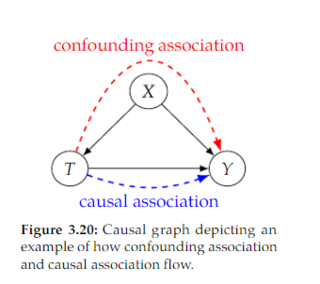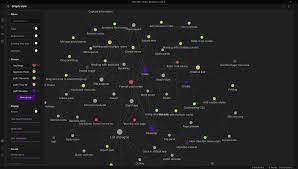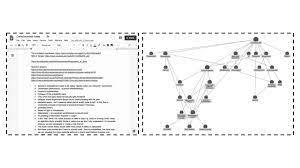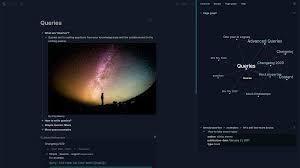Edited, memorised or added to reading queue
on 30-Aug-2022 (Tue)
Do you want BuboFlash to help you learning these things? Click here to log in or create user.
Flashcard 7101885582604
| status | not learned | measured difficulty | 37% [default] | last interval [days] | |||
|---|---|---|---|---|---|---|---|
| repetition number in this series | 0 | memorised on | scheduled repetition | ||||
| scheduled repetition interval | last repetition or drill |
Parent (intermediate) annotation
Open itWe refer to the flow of association along directed paths as causal association
Original toplevel document (pdf)
cannot see any pdfs| status | not read | reprioritisations | ||
|---|---|---|---|---|
| last reprioritisation on | suggested re-reading day | |||
| started reading on | finished reading on |
Myth: You can get more sleep by going to sleep earlier - supermemo.guru
like natural wisdom. When they show some discipline and go to sleep early, they will easily fall asleep like a log and get more (not so perfectly refreshing) sleep. Little do they realize that <span>a teenage body clock is shifted well enough to make early sleep unworkable or harmful. If he is lucky, the teenager will toss and turn for a long while in bed, suffer the pain of insomnia, and fall asleep even later. On a bad day, the same kid may fall asleep, wake up pre
| status | not read | reprioritisations | ||
|---|---|---|---|---|
| last reprioritisation on | suggested re-reading day | |||
| started reading on | finished reading on |
archive.ph
sed, the very elderly and a few other groups — have the capacity to keep themselves relatively safe from a severe case of covid with vaccines, boosters, antivirals, masks, ventilation and more. <span>The phrase “no worse than the flu” has morphed from a covid-minimizing canard into an epidemiologically accurate statement — at least when it comes to hospitalizations and deaths. Advertisement Story continues below advertisement The easing of the threat of acute covid, however, has brought the dangers of long covid into focus. With high case rates in my city, Sa
| status | not read | reprioritisations | ||
|---|---|---|---|---|
| last reprioritisation on | suggested re-reading day | |||
| started reading on | finished reading on |
archive.ph
not because I fear dying of covid; I no longer do, even though I’m in my mid-60s. It’s because of long covid. [I’m a 64-year-old vaxxed doctor. Here’s how I calculate my covid risk at parties.] <span>There have been many studies assessing the risks of long covid (generally defined as any symptom persisting more than one or two months after the acute infection). Most find that the prevalence of long covid is approximately 10 to 20 percent. The prevalence seems to be a bit lower in men than women, lower if the initial infection was mild, lower after an omicron infection as compared with prior versions of the coronavirus an
| status | not read | reprioritisations | ||
|---|---|---|---|---|
| last reprioritisation on | suggested re-reading day | |||
| started reading on | finished reading on |
archive.ph
ms to be a bit lower in men than women, lower if the initial infection was mild, lower after an omicron infection as compared with prior versions of the coronavirus and lower after vaccination. <span>Even with all these mitigating factors, the best-protected person still likely has at least a 1-in-20 chance of lingering symptoms if they get covid today. And while some cases of long covid involve a single symptom that doesn’t markedly diminish quality of life (such as a cough or mild taste disturbance), others involve disabling symptoms
| status | not read | reprioritisations | ||
|---|---|---|---|---|
| last reprioritisation on | suggested re-reading day | |||
| started reading on | finished reading on |
archive.ph
ng a strategic shift] In addition to symptoms that last for several months or more, there’s also a risk of other long-term complications that are set in motion by the original case of covid-19. <span>For reasons that aren’t completely understood, people who have had covid have a significant increase in heart attacks, stroke, diabetes and blood clots, measured at least one year from the time of their infection. There is evidence, too, of brain shrinkage, although the implications of this are not yet clear. These findings mean that, on top of the risk of chronic symptoms, a case of covid may increase the long-term odds of several diseases that are among our leading causes of death and disa
| status | not read | reprioritisations | ||
|---|---|---|---|---|
| last reprioritisation on | suggested re-reading day | |||
| started reading on | finished reading on |
archive.ph
hat are among our leading causes of death and disability. Given such risks, what’s a person to do? First of all, if you haven’t gotten at least three vaccine shots, you should make sure you do. <span>Up-to-date vaccination — in addition to its other benefits — lowers the odds of long covid by 15 to 50 percent, depending on the study. (While there are theoretical reasons to believe that the anti-viral drug Paxlovid may also decrease the chance of long covid, there is currently no empirical proof that it does.) Advert
| status | not read | reprioritisations | ||
|---|---|---|---|---|
| last reprioritisation on | suggested re-reading day | |||
| started reading on | finished reading on |
archive.ph
dvertisement Story continues below advertisement Beyond that, I continue to favor taking more precautions than you would if you were looking only at the figures for deaths and hospitalizations. <span>For my part, I will ditch the mask at the supermarket and resume indoor dining when I am confident that case rates have fallen considerably, to below 10-20 cases per 100,000 per day. (The current official U.S. case rate of 32 per 100,000 per day probably translates into an actual count of approximately 120-150 when one takes into account all the unreported cases dia
| status | not read | reprioritisations | ||
|---|---|---|---|---|
| last reprioritisation on | suggested re-reading day | |||
| started reading on | finished reading on |
Using spaced repetition systems to see through a piece of mathematics
messy and contain false turns. But I wanted to mention discovery fiction as a good example of a process which gives rise to a very different kind of understanding than the Ankification process. <span>What about other subjects? Mathematics is particularly well suited to deep Ankification, since much of it is about precise relationships between precisely-specified objects. Although I use Anki extensively for studying many other subjects, I haven’t used it at anything like this kind of depth. In the near future, I plan to use a similar process to study some of the absolute core results about climate change, and perhaps also to study some of the qualities of good writing (e.g., I can imagine using a similar process to analyze the lead sentences from, say, 30 well-written books). I don’t know how this will go, but am curious to try. I’m a little leery of coming to rely too much on the process – creative work also requires many skills at managing uncertainty and vagueness. But as a limited-use cognitive tool, deep Ankification seems potentially valuable in many areas. Follow me on Twitter Acknowledgments Many thanks to everyone who has talked with me about spaced-repetition memory systems. Especial thanks to Andy Matuschak, whose conversation has dee
Flashcard 7547580976396
| status | not learned | measured difficulty | 37% [default] | last interval [days] | |||
|---|---|---|---|---|---|---|---|
| repetition number in this series | 0 | memorised on | scheduled repetition | ||||
| scheduled repetition interval | last repetition or drill |
Parent (intermediate) annotation
Open itThe prevalence seems to be a bit lower in men than women, lower if the initial infection was mild, lower after an omicron infection as compared with prior versions of the coronavirus and lower after vaccination.
Original toplevel document
archive.phof long covid (generally defined as any symptom persisting more than one or two months after the acute infection). Most find that the prevalence of long covid is approximately 10 to 20 percent. <span>The prevalence seems to be a bit lower in men than women, lower if the initial infection was mild, lower after an omicron infection as compared with prior versions of the coronavirus and lower after vaccination. Even with all these mitigating factors, the best-protected person still likely has at least a 1-in-20 chance of lingering symptoms if they get covid today. And while some cases of long
| status | not read | reprioritisations | ||
|---|---|---|---|---|
| last reprioritisation on | suggested re-reading day | |||
| started reading on | finished reading on |
Unknown title
#!/usr/bin/env runghc {- | Useful for converting lists into multiple questions. For example, if we *really* wanted to memorize the order of the early Chinese dynasties, which "Shang -> Zhou -> Han", and we don't trust ourselves to write some basic questions to remember it, we could just do something like > echo -e 'Shang\nZhou\nHan' | runghc memo4.hs and it will write 14 questions for us, which will make sure we remember it! The generated question are in tab-separated format (accepted by most SRS programs such as Mnemosyne or Anki) and look like this: > What did Shang come before?\tZhou > What succeeded Shang?\tZhou > What ordinal position was Shang?\t1st > What was 1st?\tShang > What came before Zhou?\tShang > What preceded Zhou?\tShang > What did Zhou come before?\tHan > What succeeded Zhou?\tHan > What ordinal position was Zhou?\t2nd > What was 2nd?\tZhou > What came before Han?\tZhou > What preceded Han?\tZhou > What ordinal position was Han?\t3rd > What was 3rd?\tHan If after all these questions you can't remember the order, then you need to consult a doctor! -} module Main (main) where import Data.Maybe (fromJust, listToMaybe) import System.Environment (getArgs) {- -- The general design/idea. May not be isomorphic to the actual code... x = ["Franklin", "Jefferson", "Adams"] x' = zip [1..] x x' == [(1, "Franklin"), (2, "Jefferson"), (3, "Adams")] -- pair might seem like a lot of trouble, but now that each item has -- a copy of all the data it needs (previous, next, and its logical position), -- we can treat each item independently, and avoid things like zippers or folds -- in favor of straightforward maps. x'' = pair x' x'' == [(Nothing, Just "Franklin", Just "Jefferson", Just 1), (Just "Franklin", Just "Jefferson", Just "Adams", Just 2), (Just "Jefferson", Just "Adams", Nothing, Just 3)] x''' = clozeify x'' x''' == ["", -- Nothing preceded Franklin, so we fall through to "", which will -- get removed later by 'concat' "What came after Franklin?\tJefferson\nWhat succeeded Franklin?\tJefferson", "What ordinal position was Franklin?\t1st\nWhat was 1st?\tFranklin", "What came before Jefferson?\tFranklin\nWhat preceded Jefferson?\tFranklin", "What came after Jefferson?\tFranklin\nWhat succeeded Jefferson?\tAdams", "What ordinal position was Jefferson\t2nd\nWhat was 2nd?\tJefferson", "What came before Adams?\tJefferson\nWhat preceded Adams?\tJefferson", "", -- Nothing succeeded Adams in our list "What ordinal position was Adams?\t3rd\nWhat was 3rd?\tAdams"] x'''' = unlines x''' x'''' == "What came after Franklin?\tJefferson\nWhat succeeded Franklin?\tJefferson\nWhat ordinal position was Franklin?\t1st\nWhat was 1st?\tFranklin\mWhat came before Jefferson?\tFranklin\nWhat preceded Jefferson?\tFranklin\nWhat came after Jefferson?\tFranklin\nWhat succeeded Jefferson?\tAdams\nWhat ordinal position was Jefferson\t2nd\nWhat was 2nd?\tJefferson\nWhat came before Adams?\tJefferson\nWhat preceded Adams?\tJefferson\nWhat ordinal position was Adams?\t3rd\nWhat was 3rd?\tAdams" -- Note that this assumes one has concatted the [[String]] result of clozeify, -- and optionally gotten rid of the various "" in it. -- But now we can do what we want with it, like print it. main = do list <- fmap lines getContents let foo = concat . clozeify . pair . number $ list print $ unlines foo -- But we can rewrite this using 'interact'. -} main :: IO () main = do item <- fmap (maybe "" (\a -> " " ++ a ++ " ") . listToMaybe) getArgs interact (unlines . filter (/= "") . concat . clozeify item . pair . number . lines) where number :: [String] -> [(Int, String)] number = zip [1..] type Answers = (Maybe String, -- ^ Previous entry in list Maybe String, -- ^ Current entry in list Maybe String, -- ^ Next entry in list Maybe Int) -- ^ Index from original list of items pair :: [(Int, String)] -> [Answers] pair x = map bar x where bar y = let index = fst y in (lookup (index - 1) x, -- we look up the previous entry -- our current item, eg. "Franklin"; this is guaranteed to be there, so we Just it Just $ snd y, lookup (index + 1) x, Just $ fst y) clozeify :: String -> [(Maybe String, Maybe String, Maybe String, Maybe Int)] -> [[String]] clozeify item = map (\(a, b, c, d) -> let b' = fromJust b in [(case a of Nothing -> "" Just a' -> "What" ++ item ++ " came before " ++ b' ++ "?\t" ++ a' ++ "\n" ++ "What" ++ item ++ " preceded " ++ b' ++ "?\t" ++ a'), (case c of Nothing -> "" Just c' -> "What" ++ item ++ " did " ++ b' ++ " come before?\t" ++ c' ++ "\n" ++ "What" ++ item ++ " succeeded " ++ b' ++ "?\t" ++ c'), (case d of Nothing -> "" Just d' -> "What" ++ item ++ " was " ++ englishfy d' ++ "?\t" ++ b' ++ "\n" ++ "What position" ++ item ++ " was " ++ b' ++ "?\t" ++ englishfy d')]) englishfy :: Int -> String englishfy n | c (1::Int) = n' ++ "st" -- 21st, 1st, etc. | c (2::Int) = n' ++ "nd" | c (3::Int) = n' ++ "rd" | otherwise = n' ++ "th" -- 20th, 24th, 25th, 26th, 27th, 28th, 29th etc. where n' = show n c x = mod n 10 == x -- it's the terminal digit that determines the English treatment
| status | not read | reprioritisations | ||
|---|---|---|---|---|
| last reprioritisation on | suggested re-reading day | |||
| started reading on | finished reading on |
What Is The Best Zettelkasten Software?
n different ideas, you can increase your knowledge and become more productive while studying or researching. Several zettelkasten software programs can help you get the most out of this method. <span>1. Obsidian Price: There is a free plan available. The pay plan starts at $25, a one-time payment only Best For: Those who love drawing mind maps on a desktop computer Obsidian allows people to link their ideas together, forming a mindmap Obsidian is a powerful note-taking software with various unique, contemporary features. It allows people to link their ideas together, forming a mindmap. There is an idea placed in the center, and then each supporting idea branches off of that. Because you can link your ideas together, it is perfect for those using the Zettelkasten method. The user interface is straightforward. You can add hashtags to your notes, create footno
| status | not read | reprioritisations | ||
|---|---|---|---|---|
| last reprioritisation on | suggested re-reading day | |||
| started reading on | finished reading on |
What Is The Best Zettelkasten Software?
es that well. It runs well on Windows, macOS, and Linux, so it is a versatile program that will run well on just about every central platform; however, there is no mobile application available. <span>Pros It gives users the ability to work offline. You can create a mind map using existing markdown editor files. Highly customizable. Customer complaints are handled quickly and efficiently. Cons Not open source. You can only access it using a desktop computer. Also, the program can be a bit slow and clunky at times. 2. Roam Research Price: There is a free trial available. The paid plan starts at $100 per year Best For: Academic professionals who do a tremendous amount of research regularly Another
| status | not read | reprioritisations | ||
|---|---|---|---|---|
| last reprioritisation on | suggested re-reading day | |||
| started reading on | finished reading on |
What Is The Best Zettelkasten Software?
mizable. Customer complaints are handled quickly and efficiently. Cons Not open source. You can only access it using a desktop computer. Also, the program can be a bit slow and clunky at times. <span>2. Roam Research Price: There is a free trial available. The paid plan starts at $100 per year Best For: Academic professionals who do a tremendous amount of research regularly Another popular zettelkasten tool is called Roam Research. This is a desktop app that has been specifically designed to help people organize their ideas more effectively before writing an academic paper or essay. Furthermore, the application helps people solve problems that they might not otherwise be able to solve by uncovering patterns, which is the center of the zettelkasten method. The application is easy to use, it gives people the ability to collaborate in real-time, and the user can make new pages constantly. Then, the pages can be tied together, helping people
| status | not read | reprioritisations | ||
|---|---|---|---|---|
| last reprioritisation on | suggested re-reading day | |||
| started reading on | finished reading on |
What Is The Best Zettelkasten Software?
other note and designate that it is supposed to link to the central note. Users can quickly bounce back and forth between pages when this happens, discovering how the ideas might link together. <span>Pros It is straightforward to link ideas together. The interface is clean and does not have a lot of distractions. Users can integrate images and videos easily. The learning curve is very short. Cons There are no printing capabilities included in the program. There is no way to export documents in Docx or PDF formats. There is no web clipper available. 3. Logseq Price: Free. Donations are encouraged Best For: Those who prioritize their privacy and like making to-do lists Logseq is an open-source knowledge base management program that
| status | not read | reprioritisations | ||
|---|---|---|---|---|
| last reprioritisation on | suggested re-reading day | |||
| started reading on | finished reading on |
What Is The Best Zettelkasten Software?
The learning curve is very short. Cons There are no printing capabilities included in the program. There is no way to export documents in Docx or PDF formats. There is no web clipper available. <span>3. Logseq Price: Free. Donations are encouraged Best For: Those who prioritize their privacy and like making to-do lists Logseq is an open-source knowledge base management program that prioritizes privacy. It is used to write, organize, and distribute thoughts with others as you see fit. In addition, you can use the program to connect your thoughts as you see fit. Then, you can see your knowledge graph grow as you link various ideas together, which is supposed to represent new neurons and ideas coming together, which is a perfect example of the zettelkasten method at work. You can also use this program to organize your tasks and projects. There are commands built-in that will help you prioritize some ideas over others. There is also a query system that yo

 Obsidian allows people to link their ideas together, forming a mindmap
Obsidian allows people to link their ideas together, forming a mindmap
